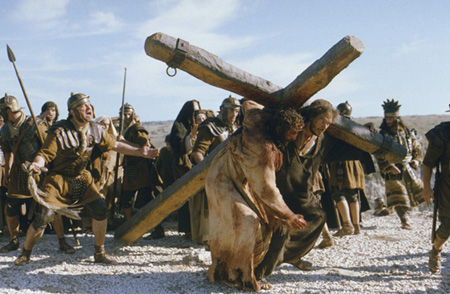
My dad recently returned from a trip he took to Israel, and got to visit many historical land marks and see lots of cool things. Anyways, he sent me (and I'm assuming other friends and family,) an Easter card with a little "Easter message" he wrote about what he learned from visiting the Garden of Gethsemane in Jerusalem. I've posted it here in case anybody would like to read it:
"The Garden of Gethsemane is located on the lower slopes of the Mount of Olives, just across the Kidron valley from the east wall of the Old City of Jerusalem. My estimate is that it is only about 225 yards from the east wall of the Old City (as the nightingale flies anyway). The Garden today is well maintained and dominated by ancient olive trees, a number of them estimated to be over 2000 years old! The term 'Gethsemane' means 'oil press.' One presumes that it was the site of many olive trees and of a large oil press in biblical times. The Garden of Gethsemane was undoubtedly considerably larger back in the times of Jesus than it is now.
The Garden was a favorite meeting place for Jesus and his disciples. After the Last Supper, it was the place that Jesus took his disciples (except for Judas). As recounted in the Gospels, it was the site of Jesus' agony, betrayal and arrest. Upon arriving at Gethsemane that night, Jesus apparently left most of the disciples at the entrance, taking Peter, James and John inside with him to pray.
Matthew's gospel says that Jesus began to be sorrowful and troubled. It also says he fell to the ground, where he made a most remarkable statement in his prayer: "My Father, if it is possible, may this cup be taken from me. Yet not as I will, but as your will." [Matthew 26:39] What did he mean by this?
The human side of Jesus knew how difficult the coming hours would be- he was moments away from being arrested, which would quickly be followed by his trial and crucifixion. The God of the universe who came to the earth as a man [Jesus, of course] was about to undergo a humiliating and painful death. The human side of him did not want to drink from the Cup of Divine Wrath, which was to be the punishment for the sins of mankind. Though the "cup" was abhorrent to him, he willingly took it because it was the will of his Father.
What is this Scripture passage really supposed to teach us? I have pondered this since coming home. This is what I believe ...
Jesus, within earshot of three of his disciples, in essance asked God the Father if there was an easier way for humanity to be saved from their sins than for him to die as their sacrifice.
Of course, Jesus knew the answer before he prayed to the Father! Though we do not hear the actual voice of the Father answering, we know that he would have said something like this: 'There is no other way! Jesus, my Son, you have to die for them.'
Had there been an easier payment for our sins, had there been an easier way to restore our fellowship with a perfect holy God- the Father would have spared his one and only Son from experiencing the cup of his wrath. In his prayer, Jesus consciously, deliberately, and voluntarily subjugated all of his human desires to the Father's perfect will.
Any faith that is not grounded in the death of Jesus Christ as payment for our sins is not a faith with any power to save- power to assure us of spending eternity in heaven with the Creator of the universe. Many in the world do not want to believe this, thinking that all supposed paths to god are equally true. Certainly, it is not popular in our day to assert claims of absolute truth. However, that is what the Word of God says repeatedly! We are free to believe it or not. But, each one of us will eventually find out the truth- we need to find out before it is too late.
I personally prefer to have had Jesus drink from the Cup of Divine Wrath for me, rather than for me to have to drink that cup myself. The God of the universe who created you and me loved you and me so much that He died for us!
And the Father raised Jesus up from the dead to show that he was indeed God's son, like Jesus had said, and that his sacrifice had been accepted.
This is the free gift that Jesus promises to all who believe. That is the Gospel message- the Good News. What better news could there be?!
This is what I learned in the Garden of Gethsemane, and is my message to you for this Easter.
April 2, 2007
JBM"
Writer's Block: I wanna be just like you
14 years ago

0 comments:
Post a Comment